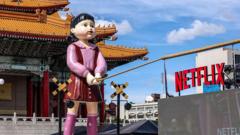The finale of "Squid Game" prompts viewers to ponder the show’s raw reflections of societal truths and the juxtaposition of hope and despair in contemporary life.
**Squid Game Concludes: Reflections on Reality and Society in South Korea**

**Squid Game Concludes: Reflections on Reality and Society in South Korea**
As fans bid farewell to the hit series, the themes resonate deeply with real-life struggles faced by South Koreans.
In a dramatic conclusion, "Squid Game" has officially wrapped its final season, captivating millions and sparking reflections among South Koreans about the society that inspired the dark narrative. The high-stakes series, portraying cash-strapped contestants competing in deadly versions of traditional games, has resonated deeply since its debut in 2021. The show's iconic symbols, including a giant doll reminiscent of its heart-wrenching themes, took center stage during a vibrant parade in Seoul celebrating its finale.
Despite its fictional premise, the underlying realities depicted in "Squid Game" mirror the daily struggles of South Koreans living amidst stiff competition and prevailing economic inequality. Commenters on social media have noted how the show captures the ruthlessness inherent in daily life, with one viewer stating, "It revealed the true feelings of Korean people, reflecting our realities in the workplace."
Drawing on the backdrop of South Korea's labor issues, the character of Seong Gi-hun echoes real-life struggles faced by many individuals, such as the impactful 2009 SsangYong Motor factory strike. The complexities of modern life—youth unemployment, precarious labor conditions, and strained familial ties—are encapsulated in the characters’ diverse backgrounds, making the show feel unsettlingly relevant to many.
While the finale was marked by a grandeur celebration, its themes of humanity's darker aspects weren’t lost. The characters' ultimate decisions—particularly Gi-hun's tragic sacrifice—sparked varied reactions among fans, with some finding hope in his choice to prioritize kindness despite a bleak reality, while others criticized its execution as unrealistic. Hwang Dong-hyuk, the creator, acknowledged the mixed feelings, emphasizing how heightened expectations can shape audience perception.
As "Squid Game" concludes, it raises questions about the intersections of morality, societal pressure, and human nature. For some, the series served as a catalyst for introspection. "The paradox of cruelty and warmth coexisting made the finale so moving," remarked a film blogger. The series has left an indelible mark not only on entertainment but also on social discourse in South Korea and beyond, ensuring its legacy will continue to be discussed long after the curtain falls.
Despite its fictional premise, the underlying realities depicted in "Squid Game" mirror the daily struggles of South Koreans living amidst stiff competition and prevailing economic inequality. Commenters on social media have noted how the show captures the ruthlessness inherent in daily life, with one viewer stating, "It revealed the true feelings of Korean people, reflecting our realities in the workplace."
Drawing on the backdrop of South Korea's labor issues, the character of Seong Gi-hun echoes real-life struggles faced by many individuals, such as the impactful 2009 SsangYong Motor factory strike. The complexities of modern life—youth unemployment, precarious labor conditions, and strained familial ties—are encapsulated in the characters’ diverse backgrounds, making the show feel unsettlingly relevant to many.
While the finale was marked by a grandeur celebration, its themes of humanity's darker aspects weren’t lost. The characters' ultimate decisions—particularly Gi-hun's tragic sacrifice—sparked varied reactions among fans, with some finding hope in his choice to prioritize kindness despite a bleak reality, while others criticized its execution as unrealistic. Hwang Dong-hyuk, the creator, acknowledged the mixed feelings, emphasizing how heightened expectations can shape audience perception.
As "Squid Game" concludes, it raises questions about the intersections of morality, societal pressure, and human nature. For some, the series served as a catalyst for introspection. "The paradox of cruelty and warmth coexisting made the finale so moving," remarked a film blogger. The series has left an indelible mark not only on entertainment but also on social discourse in South Korea and beyond, ensuring its legacy will continue to be discussed long after the curtain falls.





















